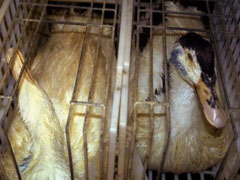Ducks and Geese
 |
Ducks on many foie gras farms are confined to cages so small that they can’t even move. |
Admired by parkgoers nationwide, ducks and geese are some of America’s best known and
most beloved animals. Adept in water, land, and air, these birds fly hundreds of miles
each year to migrate. Both ducks and geese fly and swim in formations that reduce air and
water resistance for the birds in the rear. Ducks live in couples or groups, while pairs
of geese mate for life, mourning for a significant amount of time when their partners
die.1 Learn more about the intelligence of ducks and geese.
While most people don’t think of ducks and geese when discussing cruelty to farmed
animals, these birds are severely abused by the meat and foie gras industries. Ducks
and geese raised for their flesh spend their entire lives crammed in dirty, dark sheds
where they suffer from injury and disease and are deprived of everything that is natural
to them.
Ducks and geese raised for foie gras endure the pain of having a pipe shoved down their
throats three times daily so that two pounds of grain can be pumped into their stomachs to
produce the diseased “fatty liver” that some diners consider a delicacy. Foie gras production has been deemed cruel and inhumane by experts worldwide, including the European
Union’s Scientific Committee on Animal Health and Animal Welfare.2 The state of California
recently passed a law banning foie gras because the production methods are so cruel.3
If you want to help these birds, feeding the wild ones in the park isn’t the best thing
that you can do for them, refusing to eat the flesh and livers of their tortured cousins
is. Be sure to ask your friends to boycott foie gras and duck meat as well.
Learn more.
1 Coalition to Prevent the Destruction of Canada Geese, “Frequently Asked Questions: Behavioral Questions About Geese,”
Canada-Geese.com, 2002.
2 Scientific Committee on Animal Health and Animal Welfare, “Welfare Aspects of the Production of Foie Gras in Ducks and Geese,” 16 Dec. 1998.
3 Oliver Styles, “Foie Gras Ban Imminent in California,”
Decanter.com, 28 Sept. 2004.














 'Force-Fed to Death,' narrated by Sir Roger Moore
'Force-Fed to Death,' narrated by Sir Roger Moore Foie Gras: Delicacy of Despair
Foie Gras: Delicacy of Despair French Foie Gras
French Foie Gras